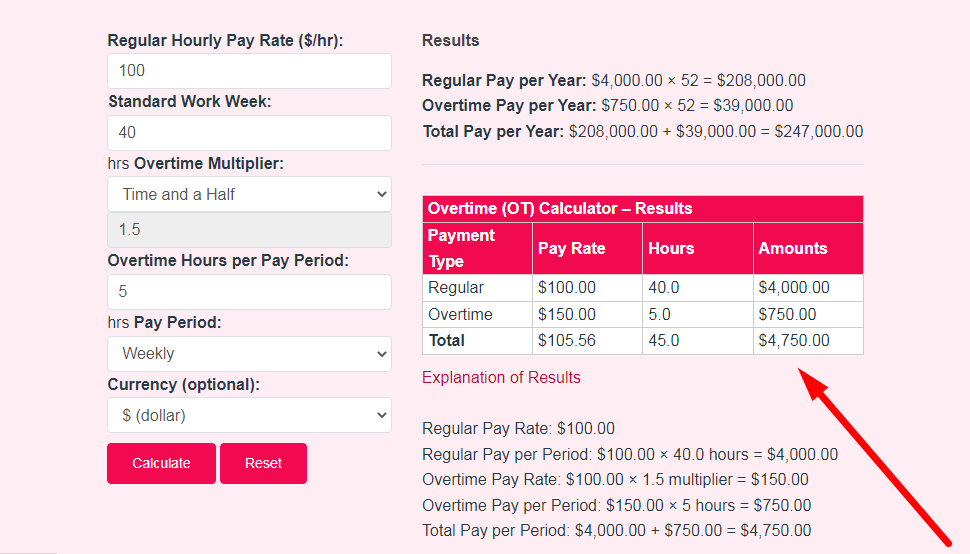Overtime Calculator
Use our overtime calculator to calculate your overtime pay at time and a half, double-time, triple-time, or any other overtime rate.
How to use this Overtime Calculator Tool?
In the modern workplace, employees often work more than the standard 40-hour workweek, earning overtime pay for their extra hours. Calculating this overtime pay can be complex, with different rules and rates depending on the country, state, or company policies. An overtime calculator is a tool that simplifies this process, helping employees and employers accurately determine overtime earnings and manage payroll. In this article, we'll explore the benefits of using an overtime calculator and how it streamlines the process of calculating overtime pay.
Understanding Overtime:
Overtime is defined as any work performed beyond the standard working hours. In most countries, the standard workweek is 40 hours, although this can vary depending on the industry and local labor laws. Any work performed beyond these standard hours is typically paid at a higher rate, known as the overtime rate.
The overtime rate is usually 1.5 times the employee's regular hourly rate, although this can vary depending on the company's policies, industry standards, and local labor laws. In some cases, employees may be eligible for double-time pay, which is twice the employee's regular hourly rate.
How the Overtime Calculator Works:
An overtime calculator is a digital tool that helps employees and employers calculate overtime earnings based on the number of hours worked and the overtime rate. Most overtime calculators allow you to input the employee's regular hourly rate, the number of regular hours worked, the number of overtime hours worked, and the overtime rate.
Once you've entered this information, the calculator will tell you the total amount of overtime pay owed to the employee. Some overtime calculators also provide a breakdown of the employee's earnings, including regular pay, overtime pay, and total pay.
Benefits of Using an Overtime Calculator:
There are several benefits to using an overtime calculator:
-
Accuracy: Calculating overtime pay manually can be time-consuming and prone to errors. An overtime calculator ensures that you're calculating the correct amount of overtime pay based on the employee's regular hourly rate, the number of regular hours worked, and the overtime rate.
-
Convenience: An overtime calculator makes the process of calculating overtime pay quick and easy. It eliminates the need for manual calculations and allows you to quickly determine the total amount of overtime pay owed to the employee.
-
Compliance: By using an overtime calculator, you can ensure that you're complying with local labor laws and regulations. It helps you accurately calculate overtime pay and avoid any potential legal issues.
-
Transparency: An overtime calculator provides a clear breakdown of the employee's earnings, including regular pay, overtime pay, and total pay. This transparency helps employees understand their earnings and ensures that they're being compensated fairly for their work.
How to Use an Overtime Calculator:
Using an overtime calculator is straightforward. Here's a step-by-step guide:
-
Enter the Regular Hourly Rate: Start by entering the employee's regular hourly rate into the calculator.
-
Enter the Regular Hours Worked: Next, enter the number of regular hours worked by the employee.
-
Enter the Overtime Rate: If applicable, enter the overtime rate. This is usually 1.5 times the employee's regular hourly rate.
-
Enter the Overtime Hours Worked: Finally, enter the number of overtime hours worked by the employee.
-
Calculate Overtime Pay: Once you've entered this information, the overtime calculator will tell you the total amount of overtime pay owed to the employee.
How to use Yttags's Overtime Calculator?
- Step 1: Select the Tool

- Step 2: Enter Following Options And Click On Calculate Button

- Step 3: Check Your Overtime Calculator Result

Conclusion:
An overtime calculator is a valuable tool that simplifies the process of calculating overtime pay. By accurately determining the amount of overtime pay owed to an employee, an overtime calculator helps employers comply with labor laws and regulations, ensures that employees are compensated fairly for their work, and streamlines the payroll process. Whether you're an employee looking to track your overtime earnings or an employer managing payroll, an overtime calculator is an essential tool for accurately calculating overtime pay.
